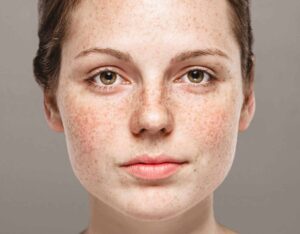
Benefits of Aloe Vera for Skin, Hair and Body
Growing up I’ve always heard about the “miraculous” benefits of aloe vera and how amazing it is for your skin and hair. It wasn’t until my husband got a second degree burn and could not soothe his injuries well enough with the medication he was provided, that I discovered how miraculous indeed aloe vera is. In trying to find any way possible to soothe his injury, he turned to the single aloe vera pot sitting outside on our balcony, minding its own business.
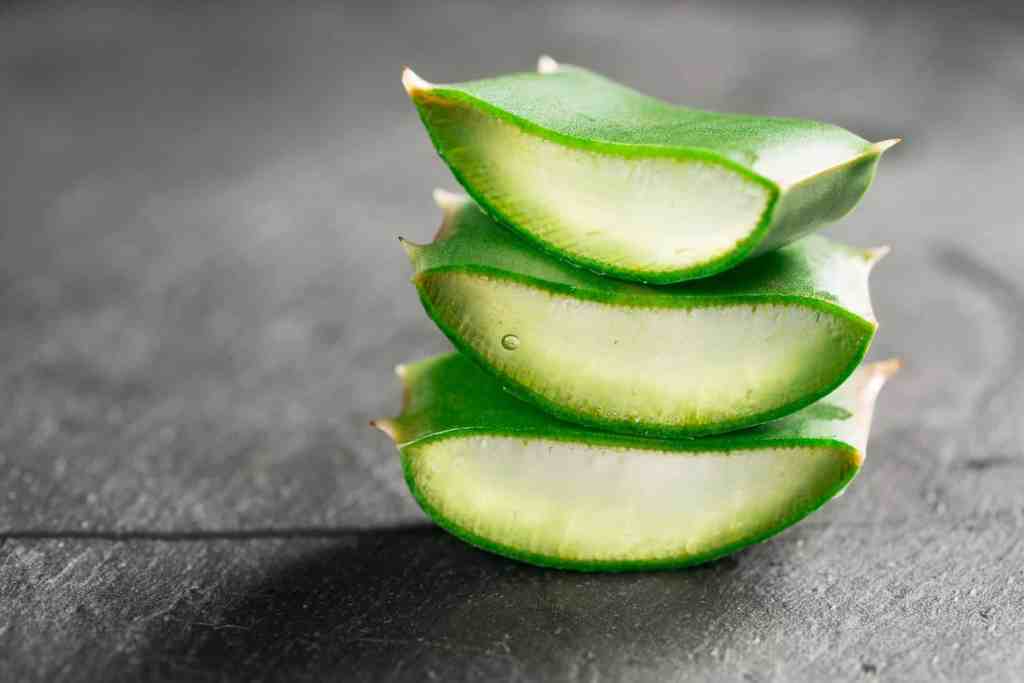
We’ve all heard aloe vera is great for burns at some point in our lives, right? I knew that, but seeing the extent of those burns, seeing how the topical creams did little to soothe the injury and seeing how applying aloe vera 2-3 times a day not just provided instant relief and got rid of the ‘still-burning’ sensation, but also completely healed the huge burn without even leaving so much as a mark in the span of just a month, immediately piqued both his and my interest in aloe vera. Needless to say ever since this discovery I’ve done my fair share of research about aloe vera and its various benefits. Here’s what I found.
Studies show that aloe vera is not only beneficial for your skin, but may also be effective in treating specific skin conditions such as acne, psoriasis, seborrhea, skin abrasions and various other conditions. Aloe vera may also promote hair growth and is a great conditioner to keep your hair smooth and shiny. This amazing plant can also help with your weight-loss journey as it contains enzymes and minerals that aid weight loss. In addition, aloe vera may help lower blood sugar levels, reduce constipation and accelerate the healing of mouth ulcers among many other health benefits. Let’s take a deeper look at aloe vera and its benefits for skin, hair, body and overall health.
What Is Aloe Vera?
Originated from the Arabian Peninsula, aloe vera is a plant that stores water in its leaves in the form of a clear gel that has been used for medicinal, health, beauty and skincare purposes for thousands of years. Aloe vera is known to grow wild in tropical, semi-tropical and arid climates. Succulents like aloe vera tend to thrive in dry climates by relying on stored water and nutrients in their leaves. There are an estimated 420 different species of aloe vera.

History of Aloe Vera
The history of aloe vera goes back thousands of years to even the egyptian queens Nefertiti and Cleopatra who used aloe vera regularly for beauty purposes. The Egyptians even named it “the pant of immortality” during the time of the pharaohs. It was also referred to as “the elixir of life” by the pharaoh. Another title given to aloe vera is the “flower of the desert” by Arabic culture. History also shows that Alexander the Great and Christopher Columbus used aloe vera to treat the wounds of soldiers. According to a review published in the Indian Journal of Dermatology, aloe vera was in use as a laxative in the United States during the early 1800s. What’s described as a “turning point” occurred in the mid-1930s when aloe vera was successfully used to treat chronic and severe radiation dermatitis. Aloe vera has also been given importance by Chinese and Japanese cultures.

Benefits Of Aloe Vera For Skin
It’s no secret that aloe vera is one of the most adored ingredients in the beauty world and the skincare industry. Even if you’re not exactly a skincare enthusiast, not coming by a product that boasts about aloe vera in its formulation, is quite rare. This is not without reason of course. Here are some reasons why aloe vera may just turn out to be your skincare hero.
- Reduces Acne
Aloe vera can help you fight acne in more ways than one. The antibacterial properties of aloe vera help fight acne when applied topically. This is because a bacteria that lives on the skin, known as Propionibacteria acnes (P.acnes) contributes to the infection of pimples. According to studies, the extent and the frequency of the acne depends on the strain of bacteria and not all bacteria cause pimples. Aloe vera is an antiseptic that provides protection against bacteria. It is also important to note that acne may be caused by underlying issues or due to hormonal factors, and therefore one must not assume that all different types of acne can simply be cured by applying aloe vera. However, aloe vera can help soothe your acne as it also has anti-inflammatory properties. This means that it can aid in reducing the swelling of your pimples. Aloe vera can also heal open pimples and reduce irritation. If you’re not yet ready for the idea of applying the gooey gel-like liquid all over your face, then you can absolutely use it as a spot treatment for acne. Just apply it on your pimples and leave it overnight.
- Treats Sunburn
Spent a long day at the beach? Forgot to reapply your sunscreen every two hours? Or if your sunscreen was just not good enough to provide the protection your skin needed, chances are you’re suffering with a stinging sunburn. Well, worry no longer. As long as you have an aloe vera plant at your home (or if you can get your hands on pure aloe vera gel) you can easily soothe that sunburn with the cooling and anti-inflammatory properties of aloe vera. More important perhaps is the fact that it also stimulates collagen production which can aid in healing your skin and improving the elasticity, dryness and firmness of your skin. With the help of mucopolysaccharides which is a substance that’s found in aloe, it can help keep your skin moisturized, which will be helpful in treating and soothing your sunburn. According to cosmetic dermatologist Kenneth Mark, MD, Vitamins A, C and E which are found in aloe are antioxidants that can help decrease sun damage by neutralizing free radicals.
- Lightens Dark Spots And Blemishes
Although aloe vera may not be able to completely diminish hyperpigmentation, it may help reduce the appearance of dark spots and blemishes, to some extent. Unfortunately there aren’t many studies conducted on the effects of aloe vera on hyperpigmented skin and the studies that exist suggest that certain substances in aloe vera may possess skin-lightening properties. These substances include aloin and aloesin. They may be able to do this by destroying existing melanin cells while also preventing further production of melanin.
- Moisturizes the Skin
If you’re looking for a moisturizer that won’t leave you feeling greasy and sticky all over, then aloe vera is the perfect solution! Especially if you have oily skin, wearing a heavy moisturizer may clog your pores and make you feel super uncomfortable overall. That’s one of the greatest things about aloe vera – it does not leave a greasy film on your face. As aloe gel is very watery, it helps hydrate the skin and lock in moisture. It also helps smoothen and soften the skin by acting as glue that sticks the upper layer of the skin cells together.
- Helps Heal Wounds
You’ve read above that aloe vera was used to treat soldiers’ wounds, even a long time back in history. Ever since the time of Christopher Columbus, the world has without a doubt advanced in its understanding of science. So let’s take a look at this from a scientific point of view. According to the publication “The Effect of Aloe Vera Clinical Trials on Prevention and Healing of Skin Wound: A Systematic Review” in the Iranian Journals of Medical Sciences, it states that “aloe vera gel can not only increase the amount of collagen in wounds but also change the composition of collagen, increase collagen cross-linking and thereby promote wound healing.”
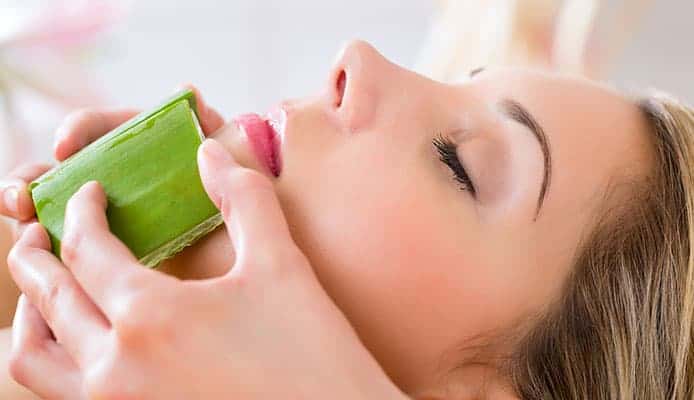
Benefits Of Aloe Vera For Hair
You’ve probably already heard about how beneficial aloe vera is for your hair and you may have also seen several hair products that boast the use of aloe vera. Although advocates of using aloe vera swear that it strengthens your hair, it’s important to note that these claims have not yet been firmly backed by science. According to MedicalNewsToday, “research suggests a positive correlation between aloe vera use and hair health, but no firm scientific link has been made.” Due to the composition of aloe vera, it is believed that the gel can provide the following benefits to your hair.
- It’s a Great Hair Conditioner
Has the harsh weather gotten to your hair? Is it looking dehydrated and stiff? Let’s change that. All you need is – you guessed it – aloe vera! It can help lock in some much needed moisture for your hair and promote a beautiful shine. It’s suitable to be used on curls as well. If you’re rocking some gorgeous curls, chances are you hesitate to use some of the hair products in the market as you don’t know how your curls are gonna look afterwards. With aloe vera, you are able to use a natural product on your hair that’s enriched with some great vitamins, minerals, amino acids and phytonutrients. It’s unlikely to ruin your curls.
- May Increase Hair Growth
According to studies, the average rate of hair growth per month is 1 centimeter. Your hair growth rate is mainly determined by your genetics and health. Hair care products such as shampoo and conditioner among other products do not show a significant change to this rate. However, aloe vera is believed to promote hair growth, mainly due to its components which include essential amino acids, vitamins and minerals that are vital for hair growth. As there are little to no risks associated with the topical use of aloe vera, it can safely be used on your hair.
- May Calm an Irritated Scalp
Do you have an itchy scalp or dandruff? Despite not causing any serious side-effects, the continuous itching (and therefore often scratching) associated with dandruff can cause discomfort and lead to inflammation. If this sounds all too familiar for you, maybe it’s time to make a homemade aloe vera hair mask. According to a study conducted in 1998 and published in the Journal of Dermatological Treatment, it was found that aloe vera aided in resolving scalp inflammation caused by dandruff.
- A Solution For Greasy Hair
Aloe vera is also an amazing natural remedy for oily and greasy hair! If your hair tends to get greasy or oily very quickly, then it’s time to cut a leaf off that aloe vera plant sitting outside on your balcony. According to a study published in the Brazilian Journal of Microbiology, aloe vera is efficient in cleansing the hair shaft and removing excess sebum and residue left behind by other products used on the hair.
- May Strengthen Hair
As we’ve mentioned before, when it comes to the ability of aloe vera gel to strengthen your hair and prevent hair fall, there are no studies that can firmly conclude this. As you may have already noticed, when it comes to hair benefits associated with the usage of aloe vera, it is sometimes assumed due to the composition of aloe vera which is basically a cocktail of some amazing ingredients. Folic acid and VitaminB12 for example are found in aloe vera gel and can help keep your hair from falling out. We’ve discussed how aloe vera can soothe sun burns on the skin, and it is possible that the vitamin content can help repair sun damage on your hair as well.
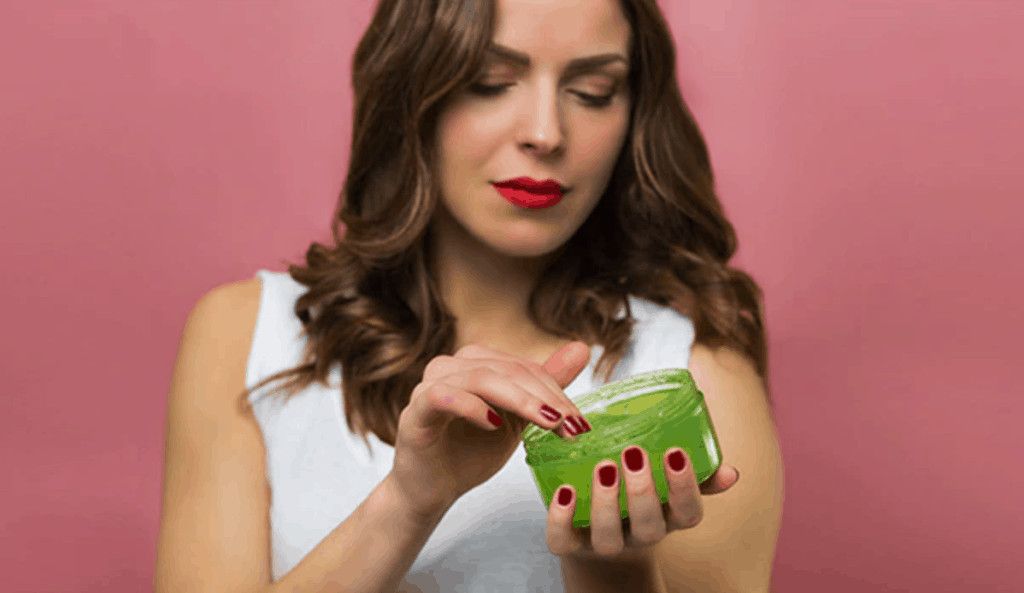
Health Benefits of Aloe Vera for Body
The numerous benefits associated with aloe vera does not stop at your skin or hair, but in fact, it’s quite beneficial for the rest of your body too. Although aloe vera is used topically for skincare and haircare benefits, for other health benefits it is usually consumed as a juice. You may be surprised at some of these benefits and will probably think of having your own personal aloe vera plant soon.
- Aids Constipation
While we know that aloe vera relieves inflammation of the skin, with the same logic in mind, it can help relieve inflammation of your digestive tract too. Aloe vera has been historically used to treat or offer relief from digestive issues which include not only constipation but diarrhea too. Aloe juice prepared with aloe latex (which contains natural laxatives) may help relieve constipation. It is however important to be aware of the possible risks involved with too much consumption of aloe latex, which we will be discussing below.
- May Help Lower Blood Sugar Levels
Aloe vera is also to some extent known as a remedy for diabetes. People use aloe vera to reduce blood sugar levels as they believe it may increase insulin sensitivity and aid in improving blood sugar management. According to a systematic review and meta-analysis on the effect of aloe vera on glycemic control in prediabetes and type 2 diabetes, eight studies found that due to aloe vera’s effect on glycemic control, it could have benefits for individuals with prediabetes or type 2 diabetes. It is also important to note that scientists do not currently recommend using aloe vera for this purpose as the quality of these studies are not up to the mark.
- It’s Great for Hydration
It definitely goes without saying that hydration is crucial for the proper functioning of your body. Staying properly hydrated not only cleanses your body by flushing out impurities, but also promotes your cardiovascular health, increases your energy, brain function, your joints and muscle function, helps maintain your body temperature and the list goes on and on. Long story short, we need to stay hydrated to stay alive (if that wasn’t painfully obvious). If you’re looking to prevent or even treat dehydration, aloe vera juice is a great solution as it’s water-dense. It’s also a great alternative to sugary drinks and processed fruit juices.
- Helps Heal Mouth Ulcers
If you’ve had the terrible luck of experiencing mouth ulcers, you probably know just how painful it can get. Mouth ulcers are mostly caused by injuries to the inside of your cheeks or lips, by accidental biting, accidentally hitting your cheeks or gums with your toothbrush (if you’re an aggressive brusher like me), and quite often if you have crowded wisdom teeth growing and rubbing against your cheeks. If you’re asking for a personal opinion, the last one’s the absolute worst. Aloe vera is effective in healing mouth ulcers (as well as canker sores and cold sores) when either applied topically or consumed as a juice. So next time you have a horrible mouth ulcer, you know what to do.
- Provides Vitamin C
When it comes to Vitamin C, it’s not only important for your skin to fight hyperpigmentation, it’s also important for your overall health. According to data by the U.S. Department of Agriculture, about 8 ounces of fortified aloe vera juice is known to contain 9.1 grams of Vitamin C. Vitamin C can help you boost immunity, prevent iron deficiency and may even reduce risk of cardiovascular diseases. It’s an essential nutrient for tissue repair and a natural antioxidant.
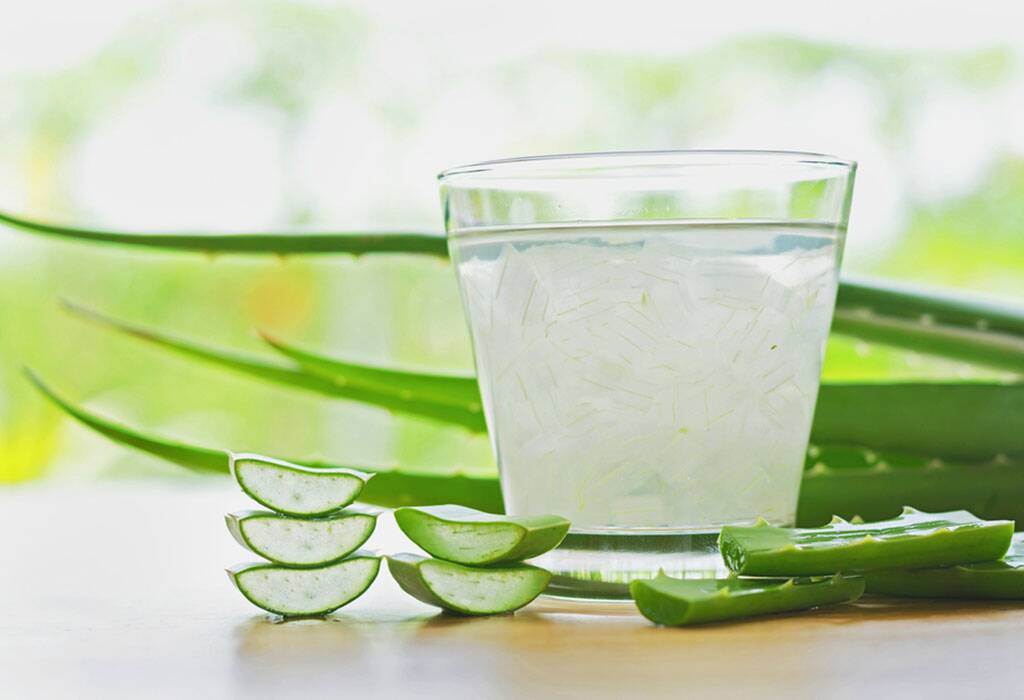
Possible Risks, Side Effects and Caution
Possible Risks
While there are researches and studies that prove how beneficial aloe vera is, it’s also important to note that there is also evidence that shows consumption of aloe vera may have unfavorable effects. According to the National Institutes of Health (NIH) the topical application of aloe vera is unlikely to cause harm. The studies conducted by the National Toxicology Program (NTP) were unable to find a strong link of aloe vera in skin care products to the development of skin cancer. However, when it comes to the consumption of aloe vera, the NTP rodent studies give cause for concern. In their studies they were able to find that an increased risk of cancer in male and female rats were associated with consumption of non-decolorized aloe vera leaf extract. Although they can’t say for sure exactly why the risk increased, they suspect that some anthraquinones in the waxy leaves may be a reason. They were able to identify the compound aloin as a potential cause of cancer. Although these studies have not been conducted on humans, it’s needless to say that limiting the consumption of aloe vera juice would be wise.
Side Effects
As for side effects, topical application of aloe vera may have an irritating effect. If this irritation progresses into a rash you may be allergic or sensitive to aloe vera and must immediately stop using it. Aloe vera contains latex which a lot of individuals are allergic to. Furthermore, even though aloe vera has antimicrobial properties, it is possible that the protective layer may actually interrupt the healing process of infected skin. So if your skin is infected, it may be a good idea to steer clear from using aloe vera and instead seek help from a dermatologist first. Another side effect (perhaps the most common one) is the laxative effects of consuming aloe vera. As laxatives are intended to relieve constipation it can cause dehydration when taken in excess amounts.
Caution
If you have stomach problems, you must steer clear from consuming aloe vera juice as it can cause cramps and pain in the stomach. However, topical application of aloe vera on your skin is generally considered safe. It is also believed that pregnant women and breastfeeding mothers should avoid the consumption of aloe vera juice due to it’s irritant qualities. Aloe vera juice may also stimulate uterine contractions in pregnant women which can lead to birth complications.
Share:
Categories
Latest Post
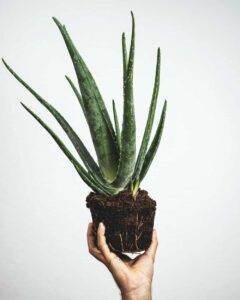
Benefits of Aloe Vera for Skin, Hair and Body

A Makeup Artist’s Guide To Perfect Pre-Makeup Skin
